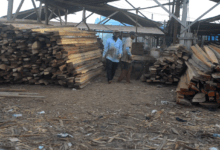PThe Municipal Chief Executive (MCE) for Kassena-Nankana, Mr Williams Adum, has announced that plans are far advanced to construct a Rice Processing Factory in the area to help add value to the production of rice.
It falls under the government’s One District One Factory Policy.
Mr Adum explained that the acquisition of the land for the factory was made possible with the support of the Paramount Chief of the Navrongo Traditional area, Pe Dennis Aneakwoa Belinia Adda
The Navrongo municipality is home to the Tono Irrigation Project noted for its great potentials in rice production, but one of the major challenges confronting the farmers is the lack of a rice processing factory to help process the crop after harvesting.
The MCE disclosed this to a group of Journalists during a working visit to Gaani, one of the communities in the municipality which had been earmarked for the construction of the Rice Processing factory.
Whilst commending the Paramount chief of the area for playing a very significant role in acquiring land for the project, the MCE assured the farmers that the rice processing plant, when completed, would help add more value to the crop and boost up its market.
Mr Adum stated that one of the potentials of the area was in rice production, adding that it was against this background that the government, through the Ghana Commercial Agriculture Project (GCAP), with funding from some development partners such as the USAID, had signed a Memorandum of Understanding with the Chinese company which had begun the rehabilitation of the laterals of the Tono Irrigation Dam to help boost rice and other cereal farming.
The MCE added that as part of measures to help increase agriculture production in the area, the government had awarded a number of roads linking farming areas to contractors and cited the Navrongo-Kologo-Naga stretch as an example of road awarded on contract.
He said through the Planting for Food and Jobs (PFJs) initiative introduced by the government, a lot of community members in the area, particularly the youth, last crop season, ventured into crop farming including maize, sorghum and rice production.
Mr Adum noted that the PFJs had not only led to the ensuring of food security in the communities, but had helped empower many of the farmers economically as well as improve upon the nutritional status of families, particularly women and children.
The MCE assured farmers that for this crop season, the government, through the Ministry of Food and Agriculture (MOFA), would put stringent measures in place to help prevent the smuggling of farm inputs, such as fertilisers by some unscrupulous persons, across neighbouring countries for sale.
FROM SAMUEL AKAPULE, NAVRONGO







